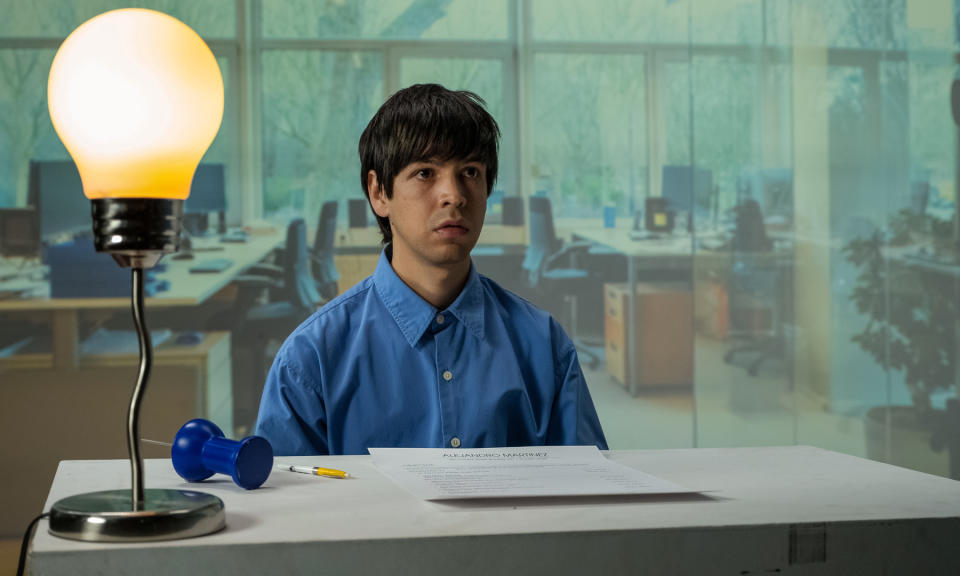‘Problemista’ Reminds You Why Tilda Swinton Is God
- Oops!Something went wrong.Please try again later.
- Oops!Something went wrong.Please try again later.
- Oops!Something went wrong.Please try again later.

You don’t have to work in media or the fashion industry to know a Miranda Priestly type. You don’t need to be a fairy princess to have encountered a Maleficent or two in your day. And you don’t need to be familiar with the NYC art world — or for that matter, be a Salvadorian immigrant looking for a way to keep your work visa active until you get your dream job at Hasbro designing twee toys for kids — to recognize someone like Elizabeth Asencio. She is the monster at the center of Julio Torres’ Problemista, a boho woman of a certain age blessed with an accent that suggests southwestern England-meets- SoHo scenester, and cursed with having to perpetually put up with idiots, i.e. her fellow human beings. Elizabeth is the worst boss you’ve ever had. She’s the person who asks to see the manager, then demands to see that manager’s manager, and keeps working her way up the corporate chain until someone can tell her why her latte is not properly foamed. Her nickname is “the Hydra.” It is well-earned.
It’s the sort of role that an actor like Tilda Swinton, who’s never met an eccentric choice or a left-field line reading she didn’t love to lean into, can make a seven-course meal out of. So maybe it’s no surprise that her Gorgon-on-Adderall performance is the best thing about Torres’ directorial debut, even though it’s very much his film in terms of conception and execution. If you’re familiar with his work as a writer on Saturday Night Live — he’s responsible for these memorably WTF sketches — or his conceptual stand-up special My Favorite Shapes, or the absolutely absurdist brilliance that is his TV show Los Espookys, then you know his singular comedic voice. It’s a blend of hipster existentialism, deadpan surrealism and a sort of sensitive, child-like inner monologue that can turn deep on a dime. (In Torres’ hands, that dime would also probably be named Winston, its favorite color would be tapis blue and it would harbor a lot of anxiety about climate change.)
More from Rolling Stone
Peso Pluma Broke All the Barriers. Only He Knows Where He's Going Next
'Babes' Turns New Motherhood Into One Long, Funny, Gross Raunch-Com
'SNL': Watch Ariana Grande Perform Two New Tracks from 'Eternal Sunshine'
That sensibility is naturally a key part of Problemista‘s DNA, given that he’s doing triple duty as a writer, director and star here. The difference is that he’s thread it throughout a semi-autobiographical story about a millennial trying to make ends meet while chasing creative fulfillment and avoiding deportation. All Alejandro (Torres) wants to do is get into the Hasbro talent incubator program; he’s convinced that once the executives hear his ideas for a Barbie that has her fingers crossed behind her back and Cabbage Patch Dolls that send each other TMI texts, he’s guaranteed a permanent gig. In the meantime, Alejandro has a job at a cryogenics firm that caters specifically to artists. His job is to watch over Bobby Asencio (RZA), a painter who became terminally ill and decided to wait out a cure by freezing himself.
After a mishap involving a machine and a plug, however, Alejandro is let go by the company. He happens to get the heave ho at the exact same time that Bobby’s wife, Elizabeth, is being told by a middle manager that they’ve raised the rental space’s rates for her husband’s frozen tomb. She does not take this news well. Elizabeth sees this as simply one of the million personal affronts that she suffers on an hourly basis. Alejandro sees an opportunity. Because without a job, he risks being deported back to El Salvador and losing out on his chance to make toy trucks that have a deflating front tire (“so kids can play with a sense of urgency”). If he can help this flustered, frustrated woman organize her spouse’s artwork and save his legacy, maybe she’ll sponsor his visa. Elizabeth does not seem like an easy person to work for. But hey, desperate times, etc.
And now we have the duo that defines the comic and the power dynamic of Problemista: the young striver, willing to sacrifice little things like dignity and self-respect to get ahead, or merely stay where he’s at; and the holy terror who holds all the cards, someone who’d be daffy if she wasn’t so determined to reduce everyone to dust over minor offenses. We’ve seen variations of this before, in films like Swimming With Sharks (1994) and The Devil Wears Prada (2006) — the self-centered boss from hell who sucks the soul out of underlings one impossible “request” at a time. In many ways, Elizabeth is just this year’s model of an archetype, spruced up with a frizzy, frazzled multi-hued hairdo (kudos to the wig maker) and a gajillion watts of Big Karen Energy.

These types of entitled overlords aren’t the real targets of Torres’ wry, occasionally fey comedy, however. He has more of a bone to pick with America’s labyrinthine immigration system, which paves every step of the process with Catch 22s and ridiculously high price tags. It’s represented in the abstract here, as both a series of rooms constructed in an escalating M.C. Escher pattern and rows of hourglasses that cause people to poof into the ether. There’s no love lost for the gig economy as a whole, which seems to exist solely to humiliate folks already below a rock-bottom financial status. How else to explain late-capitalism caveats like “$200 per hour with the right attitude“? And though this is filled to the felt-lined brim with unique Torres touches — there are magical kids castles filled with mirrors, and loving mothers, and toys that could sit next to “Wells for Boys” on the store shelf — he’s not above plucking low-hanging comedic fruit. Spike Einbinder’s horrible roommate and James Scully’s upper-crust underminer are easily recognizable foils. Craigslist may come in the form of an explosion in the arts-and-crafts store run by a pixelated imp (Larry Owens), but it’s still mostly an excuse to make a joke about cleaning-boy fetishes.
All the more reason that Swinton’s glorious caricature, part urban-dwelling Disney villainess and part literal dragon lady (see: the movie’s “hydra” fantasy sequences), stands out. She channels a certain type of passive-aggressiveness and anger that almost seems to feed on itself, and forms the core of this woman’s identity: I erupt, therefore I am. Elizabeth’s day job is technically an art critic, but really, she’s a fulltime rageaholic. It fills the void left by her husband, whose wish for an art show devoted to his 13 paintings of eggs — entitled, appropriately, “13 Eggs” — gives her purpose. But fury gives her fuel. A waiter, a tech-support operator, the guy who runs the Roosevelt Island Sky Tram, Bobby’s old lover (played by the great Greta Lee), some hapless assistant who can’t use Filemaker Pro, a.k.a. “the Cadillac of archival software” — each feel her verbally eloquent wrath. Milton gifted Satan all the best lines. Torres generously does the same for Swinton.
It’s such a great Tilda turn, one you could put beside her work in Snowpiercer and Michael Clayton and her Almodóvar short The Human Voice, that it not only eclipses Torres’ storyline and the miscellaneous business around it, but the movie itself. Problemista seems so besotted by her character’s can-you-do-anything-right?! righteousness that it even makes a case for it near the end, which admittedly feels like a stretch. Yet given the fact that Torres’ flights of bemused, borderline-quirky fancy work best in small bursts, as opposed to feature-length fits and starts, it may be better that Swinton’s character keeps stealing the focus and jolting the film out of the comedian’s comfort zone. As a dig at generational dissatisfaction and/or a lament about the migrant’s blues, the film is good enough. As a portrait of a diva on the verge of a meltdown that could take out a metropolis, it’s a next-level nightmare.
Best of Rolling Stone

